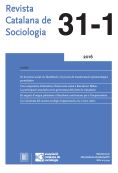Una comparativa d'iniciatives d'innovació social a Barcelona i Bilbao. La participació associativa en la governança dels drets de ciutadania
Article Sidebar

Main Article Content
Santiago Eizaguirre Anglada
This article presents the main conclusions of a doctoral thesis on participation in urban
governance based on a sample of entities promoted by civil society that are aimed at dealing
with the dynamics of social exclusion in two different cities: Barcelona and Bilbao. A comparison
has been made of how civil society is organised in both cities in five different areas
of innovation (labour integration, promotion of solidarity economy, defence of citizen
rights for migrants, sociocultural renewal of deprived neighbourhoods, and defence of the
right to housing). While in one context multilevel governance tends to promote social innovation
in parallel to the provision of welfare services and resources (Bilbao), in the other
context this promotion is carried out under tighter conditions of welfare policy financing,
which leads to a greater emphasis on the dynamics of coordination between civil society
and government (Barcelona). These differences may be related to distinct political cultures
and mechanisms used by socially transformative associations to institutionalize social innovation
dynamics. The findings unmask the apolitical use of the notion of social innovation,
observing the mechanisms through which the impact and the associative participation
in multi-level governance can be measured in order to improve citizens rights and to promote
the transformation of the power relations that are generating social exclusion dynamics.
governance based on a sample of entities promoted by civil society that are aimed at dealing
with the dynamics of social exclusion in two different cities: Barcelona and Bilbao. A comparison
has been made of how civil society is organised in both cities in five different areas
of innovation (labour integration, promotion of solidarity economy, defence of citizen
rights for migrants, sociocultural renewal of deprived neighbourhoods, and defence of the
right to housing). While in one context multilevel governance tends to promote social innovation
in parallel to the provision of welfare services and resources (Bilbao), in the other
context this promotion is carried out under tighter conditions of welfare policy financing,
which leads to a greater emphasis on the dynamics of coordination between civil society
and government (Barcelona). These differences may be related to distinct political cultures
and mechanisms used by socially transformative associations to institutionalize social innovation
dynamics. The findings unmask the apolitical use of the notion of social innovation,
observing the mechanisms through which the impact and the associative participation
in multi-level governance can be measured in order to improve citizens rights and to promote
the transformation of the power relations that are generating social exclusion dynamics.
Article Details
How to Cite
Eizaguirre Anglada, Santiago. “Una comparativa d’iniciatives d’innovació social a Barcelona i Bilbao. La participació associativa en la governança dels drets de ciutadania”. Revista Catalana de Sociologia, no. 31, pp. 19-33, https://raco.cat/index.php/RevistaSociologia/article/view/320057.